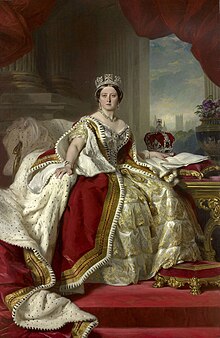| Victorian era | |||
|---|---|---|---|
| 1837–1901 | |||
 Painting of Queen Victoria by Franz Xaver Winterhalter (1859) | |||
| Monarch(s) | Victoria | ||
| Leader(s) | |||
Chronology
| |||
| History of the United Kingdom |
|---|
 |
|
|
| Periods in English history |
|---|
| Timeline |
| History of Scotland |
|---|
 |
|
|
In the history of the United Kingdom and the British Empire, the Victorian era was the reign of Queen Victoria, from 20 June 1837 until her death on 22 January 1901. Slightly different definitions are sometimes used. The era followed the Georgian era and preceded the Edwardian era, and its later half overlaps with the first part of the Belle Époque era of continental Europe.
Various liberalising political reforms took place in the UK, including expanding the electoral franchise. The Great Famine caused mass death in Ireland early in the period. The British Empire had relatively peaceful relations with the other great powers. It participated in various military conflicts mainly against minor powers. The British Empire expanded during this period and was the predominant power in the world.
Victorian society valued a high standard of personal conduct across all sections of society. The emphasis on morality gave impetus to social reform but also placed restrictions on certain groups' liberty. Prosperity rose during the period, but debilitating undernutrition persisted. Literacy and childhood education became near universal in Great Britain for the first time. Whilst some attempts were made to improve living conditions, slum housing and disease remained a severe problem.
The period saw significant scientific and technological development. Britain was advanced in industry and engineering in particular, but somewhat undeveloped in art and education. Great Britain's population increased rapidly, while Ireland's fell sharply.